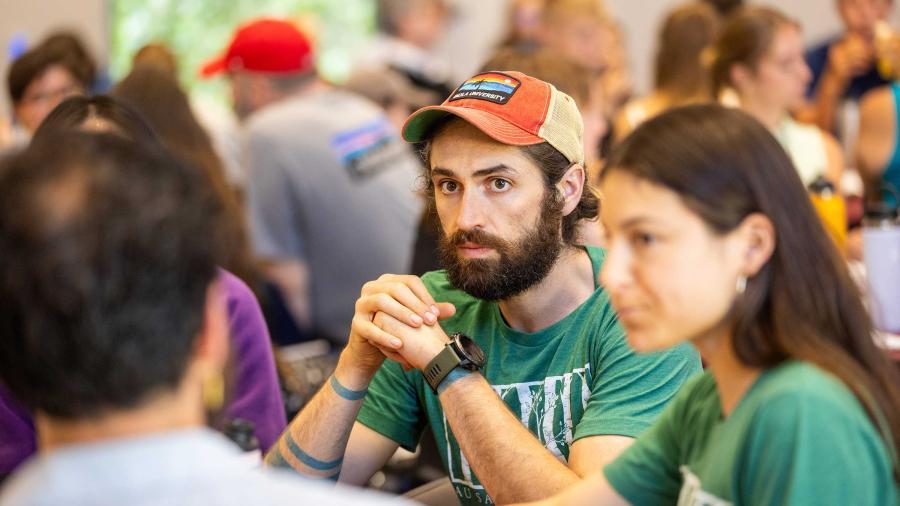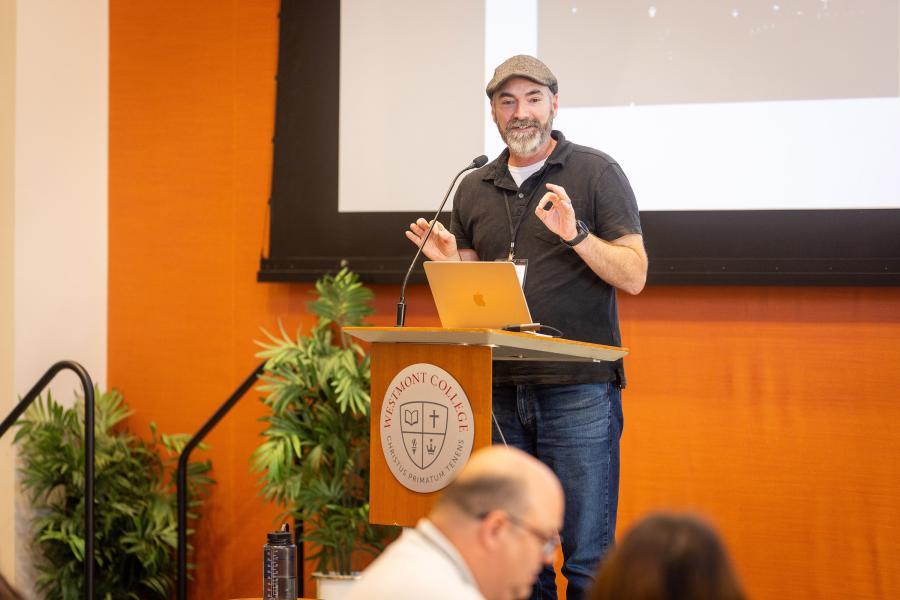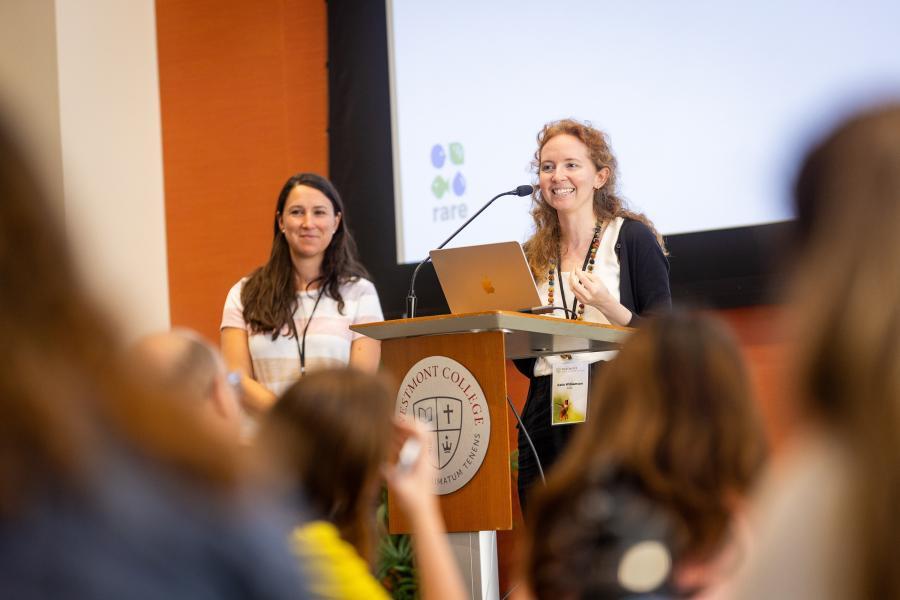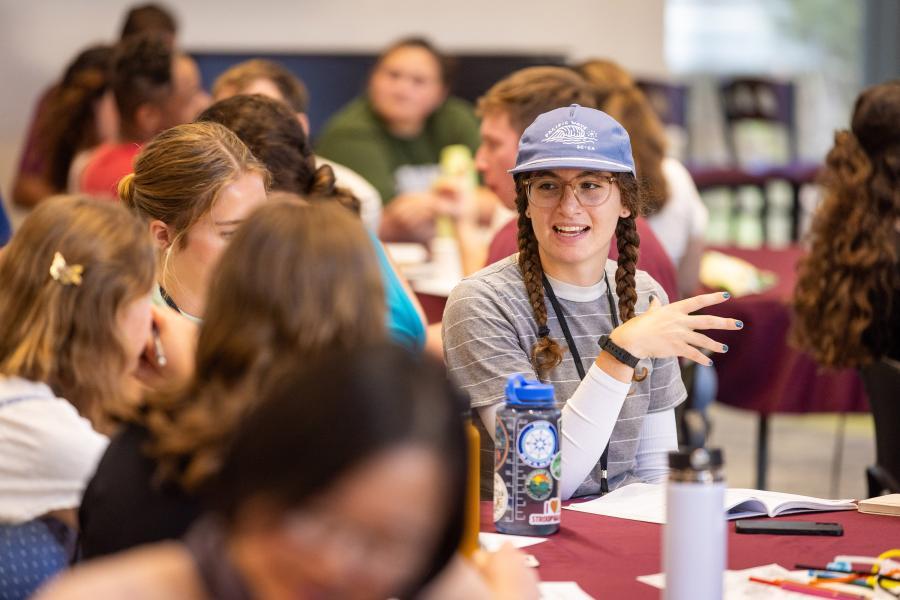Westmont News
College Hosts Christian Climate Conference

By
Scott Craig
Westmont hosted more than 70 evangelical students, professors and nationally recognized experts from across the country for the second consecutive summer to address the global challenge of climate change June 16-21. Faith. Climate. Action. A Workshop on Christian Climate Advocacy equips students who care deeply about the environment to become leaders in their communities and manage resources wisely.

“We provided interdisciplinary sessions grounded in theology about effective climate change communication with the goal of sending participants back to their home campuses and churches ready to lead and inspire,” says Janell Balmaceda, workshop coordinator and Westmont’s garden manager and sustainability coordinator.
“Climate change is a global environmental challenge that raises deep questions about what constitutes responsible stewardship of the earth and justice for all its inhabitants,” says Amanda Sparkman, wildlife biologist and director of Westmont’s environmental studies program. “Christian colleges and universities are ideally positioned to bring a redemptive influence to this important issue for contemporary society.”
Brian Webb, sustainability director at the College of Wooster in Ohio, emphasized the need to avoid polarization in environmental policy communication, suggesting different ways to approach this challenge. “White evangelical Christians are among the demographics least supportive of climate action,” he said. “Shame on us. Political polarization is extremely high, but that’s fairly unique compared to other countries, thankfully.”
He offered a large overview of historical and contemporary national environmental policy and the importance of government action on climate change, especially in the 1970s with the creation of the Environmental Protection Agency, Clean Air Act and Clean Water Act.

“Interestingly, Richard Nixon, a Republican, was president at this time,” Webb said. “Arguably the most important piece of environmental legislation was passed unanimously in the Senate and had one dissenting vote in the House. Environmental engagement has not always been politically polarizing. I personally find that comforting amidst the intense polarization that exists today.”
Following a group discussion of unique realities in the American context of climate change, Webb showed data about carbon emissions per capita from around the globe. “The United States has more carbon emissions than any major country on a per-capita basis,” he pointed out. “We’re more than double the European Union.”
Though China has more emissions overall, Webb pointed out that its population is more than four times greater than the populace of the U.S.
“Emissions in China will probably peak next year, so the ‘What about China?’ argument doesn’t hold much water,” he said. “China has vastly more renewable energy than any other country in the world and installed more renewable energy last year than the United States has in our entire history. The U.S. accounts for a quarter of all historical carbon emissions, which stay in the atmosphere for more than 100 years.”
Carina Barnett-Loro, interim executive director at Climate Advocacy Lab, and Katie Williamson, manager of learning and tools for the Center for Behavior and the Environment, examined actors, behaviors, motivations and barriers for change. Through a memorable case study, students learned that while most households were surprisingly supportive of composting, their efforts ran into stumbling blocks. Students then brainstormed strategies and solutions.
Williamson explored three core strategies — material incentives, information and rules and regulations — that can be effective. “Studies have shown that removing trays from college dining halls leads to a 54% reduction in food waste,” she said. “It helps people be more intentional about the amount of food they’re taking.”
In another example, with more than 9,000 recycling programs across the U.S., people can easily get confused about what’s recyclable and optimistically put something in the recycling bin. “Researchers say when we give people feedback and information that’s visual about what they can and can’t recycle, it lessens the amount of ‘wish cycling,’ while helping to reduce some of the contamination streams,” Williamson said.
Barnett-Loro suggested including an emotional appeal about health in messages rather than touting saving money. “This particular campaign found that framing energy conservation as a health issue — specifically for children — led to a 19% decrease in energy consumption,” she said. “On the flip side, talking about energy consumption with an economic frame, ‘If you use less energy, you’ll save money,’ led to an 8% increase in energy consumption. It’s important to realize people may not be rational and really think about how we’re appealing to people’s emotions.”
She encouraged students to focus on what’s special about their audience, such as a college or church community, when creating an appeal. “Bring people together around that shared identity, even if there may be differences in their experience with climate or different policies,” Barnett-Loro said.
The workshop included morning worship services, outings to the beach and hands-on lessons in the Westmont Garden.

Analee Josselyn, a Westmont senior who attended the conference, recently joined Citizen’s Climate Lobby on a trip to Washington, D.C. She and 70 other Californians and 1,000 CCL lobbyists spoke to legislators about the merits of speeding up energy permitting and habitat restoration.
“I was drawn to the organization because of their bipartisan approach and how they help elevate the voices of ordinary people who don’t always get a seat at the table,” she said. “My fellow college students care a lot about the climate and often feel the weight of what it means for their future and their kid’s future. But they don’t always know where to start in terms of doing something about it.”
A grant from the Montecito Rotary Club and donations from chapter members funded Josselyn’s trip.
Westmont and Arthur Vining Davis Foundation sponsored the conference.